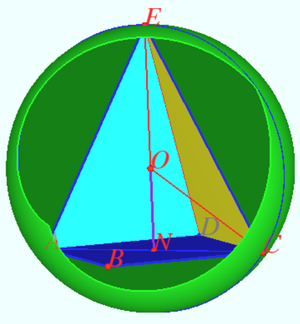Difference between revisions of "2022 AIME II Problems/Problem 3"
m (→Solution 1) |
|||
| Line 8: | Line 8: | ||
we can imagine that the line of the apex and the (sphere's) center will intersect the square at the (base's) center. | we can imagine that the line of the apex and the (sphere's) center will intersect the square at the (base's) center. | ||
| − | Since the volume is <math>54 = \frac{1}{3} \cdot S \cdot h = \frac{1}{3} \cdot 6^2 \cdot h</math>, where <math>h=\frac{9}{2}</math> is the height of this pyramid, we have: <math>l^2=(\frac{9}{2}-l)^2+(3\sqrt{2})^2</math> according to | + | Since the volume is <math>54 = \frac{1}{3} \cdot S \cdot h = \frac{1}{3} \cdot 6^2 \cdot h</math>, where <math>h=\frac{9}{2}</math> is the height of this pyramid, we have: <math>l^2=(\frac{9}{2}-l)^2+(3\sqrt{2})^2</math> according to the Pythagorean theorem. |
Solve this equation will give us <math>l = \frac{17}{4}</math>. Therefore, <math>m+n=\boxed{021}</math> | Solve this equation will give us <math>l = \frac{17}{4}</math>. Therefore, <math>m+n=\boxed{021}</math> | ||
Revision as of 01:09, 13 June 2022
Problem
A right square pyramid with volume ![]() has a base with side length
has a base with side length ![]() The five vertices of the pyramid all lie on a sphere with radius
The five vertices of the pyramid all lie on a sphere with radius ![]() , where
, where ![]() and
and ![]() are relatively prime positive integers. Find
are relatively prime positive integers. Find ![]() .
.
Solution 1
Although I can't draw the exact picture of this problem, but it is quite easy to imagine that four vertices of the base of this pyramid is on a circle (Radius ![]() ). Since all five vertices are on the sphere, the distances of the spherical center and the vertices are the same:
). Since all five vertices are on the sphere, the distances of the spherical center and the vertices are the same: ![]() . Because of the symmetrical property of the pyramid,
we can imagine that the line of the apex and the (sphere's) center will intersect the square at the (base's) center.
. Because of the symmetrical property of the pyramid,
we can imagine that the line of the apex and the (sphere's) center will intersect the square at the (base's) center.
Since the volume is ![]() , where
, where ![]() is the height of this pyramid, we have:
is the height of this pyramid, we have: ![]() according to the Pythagorean theorem.
according to the Pythagorean theorem.
Solve this equation will give us ![]() . Therefore,
. Therefore, ![]()
~DSAERF-CALMIT (https://binaryphi.site)
Solution 2
To start, we find the height of the pyramid. By the volume of a pyramid formula, we have ![]() Next, let us find the length of the non-base sides of the pyramid. By the Pythagorean Theorem, noting that the distance from one vertex of the base to the center of the base is
Next, let us find the length of the non-base sides of the pyramid. By the Pythagorean Theorem, noting that the distance from one vertex of the base to the center of the base is ![]() , we have
, we have ![\[x=\sqrt{\left(\frac92\right)^2+(3\sqrt2)^2}=\sqrt{\frac{153}4}=\frac{3\sqrt{17}}2.\]](http://latex.artofproblemsolving.com/7/5/6/7568a8673657eb8699e69661e8c82e765d9b2933.png) Taking the cross section of the pyramid and transforming the problem into
Taking the cross section of the pyramid and transforming the problem into ![]() -d, it suffices to find the radius of the circumcircle of a triangle of side lengths
-d, it suffices to find the radius of the circumcircle of a triangle of side lengths ![]() ,
, ![]() ,
, ![]() . This turns out to be easy by the formula
. This turns out to be easy by the formula ![]() , and through computing this value (the work has been left out) we find that
, and through computing this value (the work has been left out) we find that ![]() , so our answer is
, so our answer is ![]() .
.
~A1001
Video Solution (Mathematical Dexterity)
https://www.youtube.com/watch?v=UJAYW6YNFVU
See Also
| 2022 AIME II (Problems • Answer Key • Resources) | ||
| Preceded by Problem 2 |
Followed by Problem 4 | |
| 1 • 2 • 3 • 4 • 5 • 6 • 7 • 8 • 9 • 10 • 11 • 12 • 13 • 14 • 15 | ||
| All AIME Problems and Solutions | ||
The problems on this page are copyrighted by the Mathematical Association of America's American Mathematics Competitions. 










